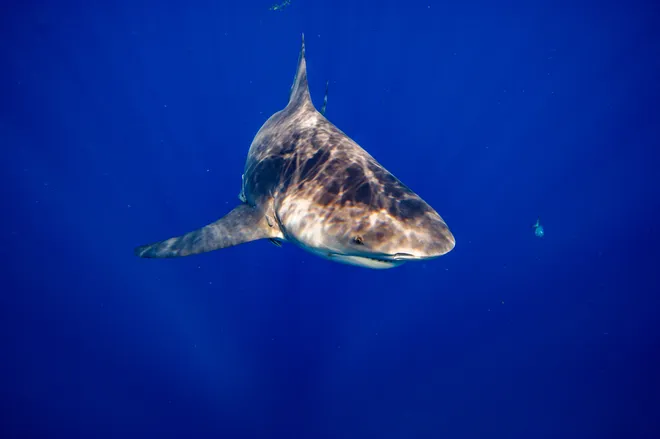Can a shark swim up a river? Yes, and it happens more than you may think
Tik Tok viewers were shocked when a video was recently posted of a man catching a bull shark in what he said was the Guadalupe River in Texas.
A shark in freshwater? Could it be true? Yes, and it probably happens more often than you think.
"They go in rivers frequently," said Jose Castro, research scientific editor for NOAA Fisheries and author of "The Sharks of North America."
"They breed in brackish water," Castro said. "The juveniles go into rivers all the time. They have been known to go hundreds of miles in the Amazon River."
They've been found in rivers in North America hundreds of miles from saltwater, too. Castro said one was found 2,800 kilometers, or 1,740 miles, up the Mississippi River. He said another was found 4,000 kilometers, or 2,485 miles, inland from the Atlantic Ocean.
"They go up rivers quite a ways," Castro said.

A bull shark in the Pearl River in Mississippi?
Two Mississippi fishermen encountered what was suspected to be a bull shark in the Pearl River in 2014.
Dave Harville of Waveland and Caden Comer, then 15 of Bay St. Louis, were fishing and Comer had a fish on his line estimated to weigh 25 pounds. As he reeled it in, what was thought to be a bull shark bit the fish in half.
"This was an exceptionally large shark," Harville told The Clarion-Ledger in 2015. "It wasn't a little blacktip shark.
"He had a good set of jaws on him. He was the kind that could take your leg off."
Although it was only about 1 1/2 miles inland, Harville said he saw no reason the shark couldn't have traveled farther inland.
How do bull sharks survive in freshwater?
Other species of sharks live their lives in saltwater. So, what is it about bull sharks that allows or motivates them to go into freshwater?
"That's the $64,000 question," Castro said. "Nobody knows.
"The only hypothesis I've ever heard is they go into freshwater to get rid of parasites. Adults generally don't go into rivers. It's usually juveniles and young."
The key word is "generally."
Have bull sharks attacked people in rivers?
Shark attacks statistically are rare events. According to Florida Museum's Yearly Worldwide Shark Attack Summary, 36 unprovoked attacks occurred in the U.S. in 2023 and 41 in 2022.
Unfortunately for people concerned about being attacked in a river, many of those bites are by the jaws of bull sharks and they can grow quite large. According to the International Game Fish Association, the world record caught by a fisherman weighed 697 pounds, 12 ounces. It was caught in Malindi, Kenya, in 2001.
"In tropical waters, bull sharks are probably the most dangerous sharks followed by tiger sharks," Castro said. "If you see a big bull shark in the water, you realize how scary they are."
Attacks in rivers are even more rare, but they do happen. The Times of India reported in February that a man was attacked by a bull shark while wading in the Vaitarna River. The shark was 7-feet long and bit off most of the man's left calf and ankle.
Other freshwater attacks have been reported around the world.
In the U.S., possibly one of the most famous attacks occurred in New Jersey's Matawan Creek in 1916. According to the Matawan Historical Society, three people were attacked in the creek and two died.
The species of the shark, estimated to have been 8-feet long, is unknown, but some say it was most likely a bull shark.
Quick tips for avoiding a shark attack
Below are six tips to help avoid a shark attack from the Florida Museum International Shark Attack File and what to do if a shark gets too close or tries to bite.
- Swim with a buddy
- Stay close to shore
- Don’t swim at dawn or dusk
- Don’t swim around schools of fish or where people are fishing
- Avoid wearing jewelry
- Avoid excess splashing
What if a shark gets near me?
- Maintain eye contact with the shark
- Slowly move away, and if possible, exit the water
What if a shark tries to bite me?
- Hit the shark in the eyes and gills (Sensitive areas that can be hurt regardless of personal strength)
- Hit the shark on the snout and push away

Do you have a story idea? Contact Brian Broom at 601-961-7225 or bbroom@gannett.com.
Disclaimer: The copyright of this article belongs to the original author. Reposting this article is solely for the purpose of information dissemination and does not constitute any investment advice. If there is any infringement, please contact us immediately. We will make corrections or deletions as necessary. Thank you.







